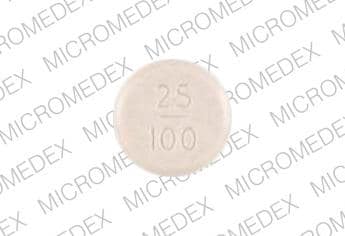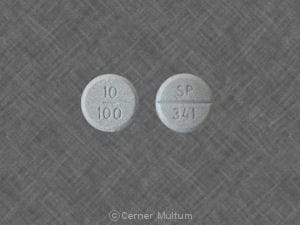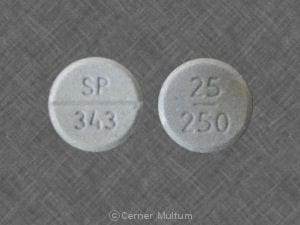What is Parcopa used for?
- Parcopa is used to treat Parkinson's disease.
- It is used to treat signs like Parkinson's disease caused by other health problems.
- Parcopa may be given to you for other reasons. Talk to your doctor.
Before taking Parcopa, tell your doctor:
- If you are allergic to Parcopa; any part of this medicine; or any other drugs, foods, or substances. Tell your doctor about the allergy and what signs you had.
- If you have any of these health problems: Glaucoma, a skin lump or growth, or a history of skin cancer.
- If you are taking any of these drugs: Reserpine or tetrabenazine.
- If you are taking any of these drugs: Linezolid or methylene blue.
- If you have taken certain drugs for depression or Parkinson's disease in the last 14 days. This includes isocarboxazid, phenelzine, tranylcypromine, selegiline, or rasagiline. Very high blood pressure may happen.
- If you are taking another drug that has the same drug in it.
This is not a list of all drugs or health problems that interact with this medicine.
Tell your doctor and pharmacist about all of your drugs (prescription or OTC, natural products, vitamins) and health problems. You must check to make sure that it is safe for you to take Parcopa with all of your drugs and health problems. Do not start, stop, or change the dose of any drug without checking with your doctor.
What are some things I need to know or do while I take Parcopa?
- Tell all of your health care providers that you take Parcopa. This includes your doctors, nurses, pharmacists, and dentists.
- Avoid driving and doing other tasks or actions that call for you to be alert until you see how Parcopa affects you.
- To lower the chance of feeling dizzy or passing out, rise slowly if you have been sitting or lying down. Be careful going up and down stairs.
- This medicine may affect certain lab tests. Tell all of your health care providers and lab workers that you take Parcopa.
- Have blood work checked as you have been told by the doctor. Talk with the doctor.
- If you have high blood sugar (diabetes), talk with your doctor about which glucose tests are best to use.
- This medicine may "wear off" as the time for your next dose gets closer. Tell your doctor if this happens and it bothers you.
- Talk with your doctor before you drink alcohol or use other drugs and natural products that slow your actions.
- The chance of a type of skin cancer called melanoma may be raised in people with Parkinson's disease. It is not known if Parcopa may also raise the chance. Have skin exams while you take Parcopa. Talk with your doctor.
- Some products may cause a dark red, brown, or black color to appear in your saliva, urine, or sweat. This is not harmful but may discolor your clothes.
- If you have phenylketonuria (PKU), talk with your doctor. Some products have phenylalanine.
- Some people have fallen asleep during activities like driving, eating, or talking. Some people did not feel sleepy and felt alert right before falling asleep. This has happened up to 1 year after Parcopa was started. If you fall asleep during activities, do not drive or do other tasks or actions that call for you to be alert while you take Parcopa. Call your doctor right away if this happens or you feel very sleepy.
- Neuroleptic malignant syndrome (NMS) is a very bad and sometimes deadly health problem that has happened when Parcopa was stopped all of a sudden. NMS has also happened when the dose of Parcopa was lowered. Call your doctor right away if you have any fever, muscle cramps or stiffness, dizziness, very bad headache, confusion, change in thinking, fast heartbeat, heartbeat that does not feel normal, or are sweating a lot.
- Tell your doctor if you are pregnant, plan on getting pregnant, or are breast-feeding. You will need to talk about the benefits and risks to you and the baby.
How is Parcopa best taken?
Use Parcopa as ordered by your doctor. Read all information given to you. Follow all instructions closely.
- Take with or without food.
- Be sure your hands are dry before you touch Parcopa.
- Take Parcopa out of the bottle right before you use it.
- Place on your tongue and let it dissolve. Water is not needed. Do not swallow it whole. Do not chew, break, or crush it.
- If you take an iron product or a multivitamin that has iron, ask your doctor or pharmacist how to take it with Parcopa. Iron may lower how well your body is able to absorb Parcopa.
- Diets high in protein, fat, or calories may lower how well your body absorbs Parcopa; tell your doctor if you have a diet like this or if you will be changing your diet. Talk with your doctor.
- Do not stop taking Parcopa all of a sudden or lower your dose without talking to your doctor. Side effects may happen.
- Keep taking Parcopa even when you are not having symptoms.
- Keep a diary of your signs.
- Keep taking Parcopa as you have been told by your doctor or other health care provider, even if you feel well.
- Take Parcopa at the same time of day.
What do I do if I miss a dose?
- Take a missed dose as soon as you think about it.
- If it is close to the time for your next dose, skip the missed dose and go back to your normal time.
- Do not take 2 doses at the same time or extra doses.
What are the side effects of Parcopa that I need to call my doctor about immediately?
WARNING/CAUTION: Even though it may be rare, some people may have very bad and sometimes deadly side effects when taking a drug. Tell your doctor or get medical help right away if you have any of the following signs or symptoms that may be related to a very bad side effect:
- Signs of an allergic reaction, like rash; hives; itching; red, swollen, blistered, or peeling skin with or without fever; wheezing; tightness in the chest or throat; trouble breathing, swallowing, or talking; unusual hoarseness; or swelling of the mouth, face, lips, tongue, or throat.
- Signs of high or low blood pressure like very bad headache or dizziness, passing out, or change in eyesight.
- Signs or symptoms of depression, suicidal thoughts, emotional ups and downs, abnormal thinking, anxiety, or lack of interest in life.
- Change in the way you act.
- Hallucinations (seeing or hearing things that are not there).
- Feeling confused.
- Strong urges that are hard to control (such as eating, gambling, sex, or spending money).
- A skin lump or growth.
- Change in color or size of a mole.
- Trouble controlling body movements that is new or worse.
- Throwing up blood or throw up that looks like coffee grounds.
- Black, tarry, or bloody stools.
- Stomach pain.
- Chest pain or pressure.
- Fast or abnormal heartbeat.
- Fever, chills, or sore throat; any unexplained bruising or bleeding; or feeling very tired or weak.
- Dark urine or yellow skin or eyes.
- Change in eyesight, eye pain, or very bad eye irritation.
- Shortness of breath.
What are some other side effects of Parcopa?
All drugs may cause side effects. However, many people have no side effects or only have minor side effects. Call your doctor or get medical help if any of these side effects or any other side effects bother you or do not go away:
- Bad dreams.
- Constipation.
- Dizziness.
- Feeling sleepy.
- Dry mouth.
- Headache.
- Trouble sleeping.
- Upset stomach or throwing up.
These are not all of the side effects that may occur. If you have questions about side effects, call your doctor. Call your doctor for medical advice about side effects.
You may report side effects to the FDA at 1-800-332-1088. You may also report side effects at https://www.fda.gov/medwatch.
If overdose is suspected:
If you think there has been an overdose, call your poison control center or get medical care right away. Be ready to tell or show what was taken, how much, and when it happened.
Parcopa Images
How do I store and/or throw out Parcopa?
- Store at room temperature.
- Store in a dry place. Do not store in a bathroom.
- Protect from light.
- Keep all drugs in a safe place. Keep all drugs out of the reach of children and pets.
- Throw away unused or expired drugs. Do not flush down a toilet or pour down a drain unless you are told to do so. Check with your pharmacist if you have questions about the best way to throw out drugs. There may be drug take-back programs in your area.
Consumer information use and disclaimer
- If your symptoms or health problems do not get better or if they become worse, call your doctor.
- Do not share your drugs with others and do not take anyone else's drugs.
- Some drugs may have another patient information leaflet. Check with your pharmacist. If you have any questions about Parcopa, please talk with your doctor, nurse, pharmacist, or other health care provider.
- If you think there has been an overdose, call your poison control center or get medical care right away. Be ready to tell or show what was taken, how much, and when it happened.
This information should not be used to decide whether or not to take Parcopa or any other medicine. Only the healthcare provider has the knowledge and training to decide which medicines are right for a specific patient. This information does not endorse any medicine as safe, effective, or approved for treating any patient or health condition. This is only a brief summary of general information about this medicine. It does NOT include all information about the possible uses, directions, warnings, precautions, interactions, adverse effects, or risks that may apply to Parcopa. This information is not specific medical advice and does not replace information you receive from the healthcare provider. You must talk with the healthcare provider for complete information about the risks and benefits of using this medicine.





